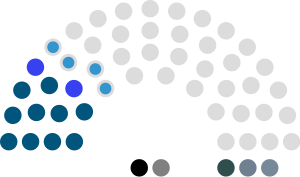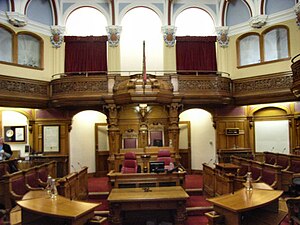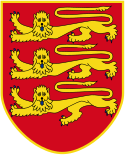User:Saltywalrusprkl/sandbox3/
States Assembly | |
|---|---|
| Type | |
| Type | |
| Sovereign | Monarch of the United Kingdom |
| History | |
| Founded | c. 1497 |
| Preceded by | Royal Court |
| Leadership | |
Sir Timothy Le Cocq since 17 October 2019 | |
Lyndon Farnham, Independent since 30 January 2024 | |
Inna Gardiner, Independent since 27 February 2024 | |
| Structure | |
| Seats | 54 (49 voting) |
 | |
Political groups | Government (24)
|
Length of term | Four years |
| Salary | £50,000 p.a. |
| Elections | |
| |
Last election | 22 June 2022 |
Next election | 2026 |
| Meeting place | |
 | |
| The States Chamber in the States Building | |
 | |
| States Building, St Helier | |
| Website | |
| statesassembly | |
| Constitution | |
| States of Jersey Law 2005 | |
| Rules | |
| Standing Orders of the States of Jersey | |
| Politics of Jersey |
|---|
 |
| Category |
The States Assembly (French: Assemblée des États; Jèrriais: Êtats d'Jèrri) is the parliament of Jersey,[1] formed of the island's 37 deputies and the Connétable of each of the twelve parishes.
The origins of the legislature of Jersey lie in the system of self-government according to Norman law guaranteed to the Channel Islands by John, King of England, following the division of Normandy in 1204.[2] The States Assembly has exercised uncontested legislative powers since 1771, when the concurrent law-making power of the Royal Court of Jersey was abolished.[3]
The Assembly passes and amends laws and regulations; approves the annual budget and taxation; appoints the chief minister, ministers and members of various committees and panels; debates matters proposed by the Council of Ministers, by individual States Members or by one of the committees or panels. Members are also able to ask questions to find out information and to hold ministers to account.[4]
Executive powers are exercised by a chief minister and eleven ministers, elected from among the members of the Assembly, and are known collectively as the Council of Ministers. Ministers are accountable to the Assembly for the conduct of their departments.
History[edit]
Origins and early history[edit]
The states has its origins in the Royal Court, the judicial and legislative body that emerged following Philip II of France’s conquest of mainland Normandy. The court had the power to both rule on cases of Norman law in the island as well as to pass new laws through petitions through the Privy Council. It was composed of the bailiff, appointed by the King, and 12 jurats elected for life.
At some point between the 13th and 16th centuries, the custom arose for the court to occasionally invite the rectors of each church and the connétables, the elected civic heads of the island’s parishes, to Conseiller la Justice (advise the court) on proposed legislation. This was initially an act of courtesy by the bailiff and the jurats, however this soon became expected as a right. These meetings of the bailiff and the three estates - jurats, rectors, and connétables - then evolved into a distinct entity from the Royal Court, and became known as the States Assembly.
The year of the States’ foundation is not entirely clear. The first mention of the three estates acting as a single decision-making body is in 1462, during the French occupation of Jersey by Pierre de Brézé in the War of the Roses. In his Ordinances of Maulverier, De Brézé ordered that jurats were to be in future chosen by the bailiff, jurats, rectors and connétables. The States is first specifically mentioned in 1497, when a deed was guaranteed "par le consentement de tous les États" (by the consent of all the States). The earliest surviving act of the States is from 1524, issued by "the Captain, the Jurats and States of the isle".
18th century[edit]
Corn riots and the code of 1771[edit]
Charlot and Magot parties[edit]
19th century[edit]
20th century[edit]
Adoption of English[edit]
German occupation[edit]
1948 reforms[edit]
Post-war politics[edit]
21st century[edit]
2005 reforms[edit]
Since 2005[edit]
Composition[edit]

The States Assembly is a unicameral parliament composed of 54 members, of which 49 have an unconditional vote.
37 deputies are elected for a four-year term from nine constituencies by multi-member plurality voting. Constituencies have four members by default, though three have more or less adjusted to the size of their population.[5] Before 2022, 29 deputies were elected to represent their parish or a district within their parish.
| # | Constituency Name | Parish | Number of Deputies |
Number of Connétables |
|---|---|---|---|---|
| 1 | St Helier South | St Helier | 4 | 1 |
| 2 | St Helier Central | 5 | ||
| 3 | St Helier North | 4 | ||
| 4 | St Saviour | St Saviour | 5 | 1 |
| 5 | St Clement | St Clement | 4 | 1 |
| 6 | St Brelade | St Brelade | 4 | 1 |
| 7 | North West | St Mary | 4 | 1 |
| St Ouen | 1 | |||
| St Peter | 1 | |||
| 8 | North | St John | 4 | 1 |
| St Lawrence | 1 | |||
| Trinity | 1 | |||
| 9 | East | Grouville | 3 | 1 |
| St Martin | 1 | |||
| Total | 37 | 12 | ||
The Connétables of the twelve parishes of Jersey are elected by first-past-the-post for a four-year term by eligible parishioners. Where running unopposed, prospective and incumbent Connétables must run against a None of the Above option. As well as their role as the head of the civil parishes, Connétables are ex oficio States Members. Collectively, the Connétables form the Comité des Connétables.[5] The position of the Connétables in the States dates to the establishment of the parliament. The States was formed as a meeting of the Bailiff with the Connétables, Rectors and Jurats. Since however, Jurats and Rectors have been removed. Previously, Connétables and Deputies also sat alongside a number of Senators, who were elected by a whole-island constituency on a multi-member plurality vote.[6]
There are also five non-voting members appointed by the Crown:[7]
- the Bailiff–who is the President (presiding officer); in his absence, the Deputy Bailiff or the Greffier, Deputy Greffier or an elected member presides
- the Lieutenant Governor of Jersey–who regularly attends the States but by convention only speaks at the ceremonial sittings marking his appointment and leaving office
- the Dean of Jersey–who conducts the opening prayers in French at every sitting and who may speak on any issue
- the Attorney General–the principal legal adviser to the States who may be called on to provide legal advice during sittings
- the Solicitor General–the Attorney General's deputy.
The clerk of the Assembly is known as the Greffier of the States.[8]
The Viscount is the executive officer of the States (but is no longer a member of the Assembly).[9]
Under the States of Jersey Law 2005, a Council of Ministers is selected from the States Assembly, whose members are the chief minister and at least seven ministers. During the 2008–2011 Assembly, 17 members sat on scrutiny panels, six sit only on the Planning Applications panel or the Privileges and Procedures Committee; and seven had no role other than as a member.[10] Following widespread criticisms of the system of ministerial government introduced in December 2005, the assembly of the States of Jersey agreed in March 2011 to establish an independent electoral commission to review the make-up of the Assembly and government.[11]
Legislative functions[edit]
A main type of legislation made by the States is known in English simply as a 'Law', and in French as a Loi (not an 'Act' as in the United Kingdom—in Jersey an Act or Acte of the States is an administrative enactment and may be in the nature of secondary legislation).
After a Law is adopted by the States it must receive royal assent and be registered with the Royal Court of Jersey before it is 'passed'.
Scrutiny functions[edit]
Members of the Assembly are responsible for scrutinizing the work of the Council of Ministers, ministers and their departments.
Scrutiny panels of backbench members of the Assembly have been established to examine:
- Economic & International Affairs [12]
- Environment, Housing & Infrastructure [13]
- Corporate Services [14]
- Children, Education & Home Affairs [15]
- Health & Social Security [16]
Review Panels are also in operation to examine the following areas:
- Brexit[17]
- Future Hospital [18]
- Care of Children in Jersey [19]
- Gender Pay Gap[20]
- Legal Aid[21]
- One Government [22]
- The Transfer of the Ambulance Service and CAMHS [23]
- Government Plan [24]
- Government Plan Efficiencies [25]
- Safer Travel Guidelines [26]
- Migration and Population [27]
A Public Accounts Committee (PAC) also scrutinizes the spending of public finances.[28] The real utility of the panels is said to be "that of independent critique which holds ministers to account and constructively engages with policy which is deficient".[29]
Broadcasting[edit]
BBC Radio Jersey broadcasts the main States sittings live on their medium wave frequency 1026 mW in Jersey, replacing the normal BBC Radio Jersey output which is a straight mirror of the FM output.
The raw feed of the States Members talking is provided by the States of Jersey and goes through a desk in the BBC Radio Jersey Studio in the States Chamber where it is mixed by the States Reporter on duty that day.
Broadcasting of the States debates began experimentally on 30 September 1986 and was made a permanent feature on 25 November the same year.
Since December 2005 the States of Jersey have released a complete written record of everything that members say during question time, statements and debates in the States Assembly using Hansard, similar to the UK parliament. These transcriptions are available on the States of Jersey website.
On 15 July 2015 the States Assembly voted 31 in favour and 13 against a proposal that cameras would be installed in the States Chamber in order to provide a live and on-demand video stream through the States Assembly website. The video feed will also be provided to the media.[30]
See also[edit]
References[edit]
- ^ "Council of Ministers adopts 'Government of Jersey' identity". Government of Jersey. Retrieved 9 February 2019.
- ^ "History of the States Assembly". States Assembly. Retrieved 19 December 2011.
- ^ "Code of 1771". Jersey Legal Information Board. 1 January 2019.
- ^ "What is the States Assembly?". Retrieved 19 December 2011.
- ^ a b c Cite error: The named reference
:0was invoked but never defined (see the help page). - ^ "States of Jersey (Miscellaneous Provisions) Law 2011". Jersey Legal Information Board. 29 July 2011.
- ^ "States of Jersey Law 2005". Jersey Legal Information Board. 1 January 2019. Article 1.
- ^ "States of Jersey Law 2005". Jersey Legal Information Board. 1 January 2019. Article 40.
- ^ "States of Jersey Law 2005". Jersey Legal Information Board. 1 January 2019. Article 41.
- ^ Ben, Quérée (5 September 2011), "Move to get more ministers 'involved'", Jersey Evening Post, p. 9
- ^ "Minutes of the States of Jersey, 15 March 2011" (PDF). States Assembly. 15 March 2011.
- ^ "Economic and International Affairs Panel". States Assembly. Retrieved 29 April 2021.
- ^ "Environment, Housing and Infrastructure Panel". States Assembly. Retrieved 29 April 2021.
- ^ "Corporate Services Panel". States Assembly. Retrieved 29 April 2021.
- ^ "Children, Education & Home Affairs Panel". States Assembly. Retrieved 29 April 2021.
- ^ "Health & Social Security Panel". States Assembly. Retrieved 29 April 2021.
- ^ "Brexit Review Panel". States Assembly. Retrieved 29 April 2021.
- ^ "Future Hospital Review Panel". States Assembly. Retrieved 29 April 2021.
- ^ "Care of Children in Jersey Review Panel". States Assembly. Retrieved 29 April 2021.
- ^ "Gender Pay Gap Review Panel". States Assembly. Retrieved 29 April 2021.
- ^ "Legal Aid Review Panel". States Assembly. Retrieved 29 April 2021.
- ^ "OneGov Review Panel". States Assembly. Retrieved 29 April 2021.
- ^ "The Transfer of the Ambulance Service and CAMHS Review Panel". States Assembly. Retrieved 29 April 2021.
- ^ "Government Plan Review Panel". States Assembly. Retrieved 29 April 2021.
- ^ "Government Plan Efficiencies Review Panel". States Assembly. Retrieved 29 April 2021.
- ^ "Safer Travel Guidelines Review Panel". States Assembly. Retrieved 29 April 2021.
- ^ "Migration and Population Review Panel". States Assembly. Retrieved 29 April 2021.
- ^ "Public Accounts Committee". States Assembly. Retrieved 22 February 2021.
- ^ Morris, P.E. (2008). "The new systems of government in the Channel Islands". Public Law. [2008] (Autumn). London: Sweet and Maxwell: 430. ISSN 0033-3565.
- ^ "Vote for States Assembly: filming proceedings and the installation of clocks – paragraphs (a) and (b)". States Assembly. 15 July 2015. Retrieved 22 January 2021.
External links[edit]
- No URL found. Please specify a URL here or add one to Wikidata.
- Government of Jersey website
- Jersey Elections site
- Text of States of Jersey Law (2005)
- Commonwealth Parliamentary Association article – Large 20MB file Archived 11 September 2008 at the Wayback Machine

